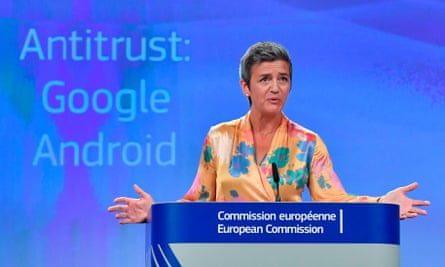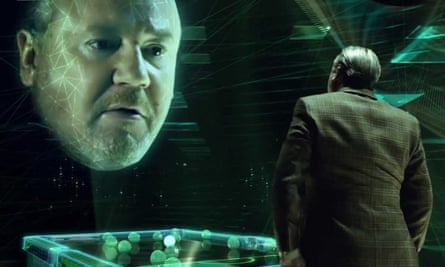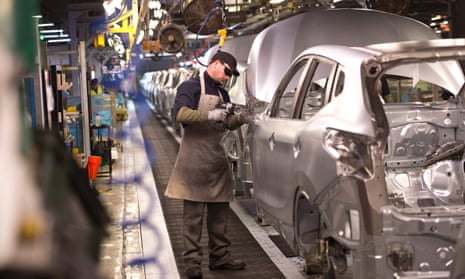There is always a sense of “they would say that, wouldn’t they?” when a state-funded global agency that promotes free trade says that a hard Brexit would be bad for everyone.
That was the International Monetary Fund’s stance before Britain’s referendum on European Union membership, and in the wake of the vote the Washington-based lender of last resort to near-bankrupt countries (most recently Argentina) has, unsurprisingly, stuck to its line.
Last week, IMF analysts said that the EU could lose as much as 1.5% of gross domestic product from a “no-deal” Brexit while the UK would suffer an even bigger hit – a 4% loss of national income.
Such are the longstanding and complex trading links between EU countries that a loss of trade is inevitable should the UK crash out of the single market and the customs union to occupy the same trading position as any other non-EU country. It’s for this reason that only a hard core of Brexit campaigners promotes a no-deal Brexit as the best way forward for the UK.
These are the economists who favour tearing down trade barriers whether the move is reciprocated or not. They welcome Britain throwing open its borders to the best goods and brightest minds the world has to offer on the basis that you get the same or better than can be produced at home for a relatively cheaper cost.
As a direct result, uncompetitive industries go to the wall while firms with a competitive edge find they can blossom. As long as the latter compensate for the losses from the former, the gamble pays off.
The trade minister, Liam Fox, the former foreign secretary Boris Johnson and the chief troublemaker, Jacob Rees-Mogg, are among the gamblers who reckon the calamity facing Britain’s car industry, aircraft industry, pharmaceuticals sector and agriculture businesses will be overcome by the enormous benefits to service companies of a new free-for-all.
The extent of this gamble is laid bare by the IMF. But the effect is not just on the UK. How the EU27, and especially those countries neighbouring Britain, would also be victims is set out in stark terms.
Ireland, the Netherlands and Belgium “are among the most exposed economies to Brexit-related adverse shocks”, the IMF said, with Ireland told to expect “output losses of similar magnitude to those estimated for the UK”.
EU officials appear to recognise that a deal is becoming more unlikely with every week that goes by – and, as resignations from Theresa May’s cabinet continue, that it is only going to get harder to find a compromise which a majority of MPs can support.
However, they don’t appear ready to do what it takes to resolve the situation, and that would be to reinterpret workers’ rights for all EU nations and not just the UK.
Maybe it’s pride that intrudes on Brussels’ negotiating position. Maybe it is a form of defeatism that denies them the energy to revisit the EU rulebook. But whatever prevents them acting, they know they should have offered David Cameron a compromise before the referendum vote – one that would have allowed him to deny EU workers access to the UK’s state services and benefits if they did not have a job on arrival.
It’s possible such a compromise will be offered as a last-gasp measure, to win over all but the hardline Brexiters to May’s compromise plan. There are many insiders who believe it would also be enough to turn the Labour MPs who voted against their own party and the Brexit bill amendment to keep Britain inside the customs union.
Without such an offer, the odds on the UK crashing out of Europe are rising. The IMF is right to highlight how harmful the impact of that would be for everyone involved.

Google fine is too little, too late
If anyone can challenge the might of Silicon Valley it is the EU’s competition commissioner, Margrethe Vestager, who has a strong track record of tackling the powerful. After more than three years of investigations, Vestager announced last week that Google’s control over the Android mobile phone platform, which is used on 80% of all phones across the world, is too great and constitutes abuse of a dominant position.
The case against Google is compelling. Europe has a problem with the way Google controls access by phone makers to its Play store, where users can buy a vast array of apps. Play is considered essential to luring any would-be phone buyer. It’s free for mobile-phone makers to license it but only if they jump through certain hoops, one of which is the pre-installation of 11 Google apps, including Chrome and search. Google has also blocked licensees from using other versions of Android and separately entered into search revenue-sharing agreements with some manufacturers.
Vestager has been decisive. She fined Google €4.3bn (£3.8bn) for “very serious illegal behaviour” and ordered it to decouple Chrome and search from licensing of the Play store and end its revenue-share deals. The fine is certainly big, but the remedy may be too little, too late to change much for the better. Google has already succeeded in cementing its services as “must-haves” that consumers seek out.
The EU’s hope that competition might grow in the form of another version of Android appears fanciful. While it may foster competition in mobile search and browsers in the long term, it could hurt consumers by increasing the costs of handsets and therefore reducing competition among smartphone manufacturers.
The intentions may be sound, but it feels as if Vestager is trying to close the door after the horse has bolted.

Online gaming is odds-on for greater regulation
The saga of fixed-odds betting terminals (FOBTs), the bookmakers’ favourite cash cow, was always something of a sideshow for the gambling industry.
With the exception of the bookies themselves, there was widespread support for curbing machines allowing punters to stake £300 a minute. But the debate dragged on too long and drowned out more pressing matters.
Online gambling, which accounts for more than 40% of the betting industry, has escaped regulatory stricture so far. But for how long?
Research by the Guardian has revealed that nearly 90 minutes of gambling adverts – dominated by online outfits – were shown on ITV during the World Cup, when peak audiences hit nearly 30 million. It comes as no surprise to hear parents complain that their children are parroting online gambling companies’ slogans, even reciting odds.
The government has said it is not minded to address gambling ads because there is no evidence they are causing any harm to kids or other vulnerable groups, such as addicts. That’s true, but only because Labour’s liberalisation of gambling in 2005 was, incredibly, not accompanied by the commissioning of in-depth research to measure the policy’s impact.
Advertising isn’t the only area that deserves greater attention. You cannot place a bet on the high street using a credit card. Not so online, where addicts freely use debt to rack up yet more debt.
The online industry’s defence is that it has the technological tools to track player behaviour and block problem gamblers. Yet a lengthening string of regulatory settlements suggests they are failing in this regard. Furthermore, GamStop, the industry scheme allowing addicts to exclude themselves from gambling sites, is in complete disarray.
Traditional bookmakers failed to get their house in order on FOBTs and paid the price. It remains to be seen whether the online industry has learned any lessons from that.
